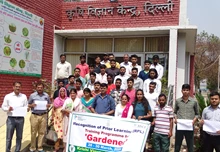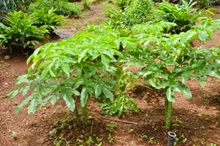
A recent report from the Environmental Working Group (EWG) has shed light on the prevalence of pesticides in commonly consumed fruits and vegetables, raising concerns about potential health risks associated with pesticide exposure.
According to the 2024 Shopper’s Guide to Pesticides in Produce, approximately 95% of nonorganic strawberries, leafy greens such as spinach and kale, collard and mustard greens, grapes, peaches, and pears tested by the United States government contained detectable levels of pesticides. These findings are based on an analysis of testing data on 47,510 samples of 46 nonorganic fruits and vegetables, primarily conducted by the US Department of Agriculture (USDA).
The report, which has been produced annually by EWG since 2004, identifies a list of the "Dirty Dozen" - the 12 most contaminated samples of produce. Nectarines, apples, bell and hot peppers, cherries, blueberries, and green beans were among those listed. These findings showcase the urgent need for consumers to be aware of pesticide levels in their food.
Pesticides have been linked to a range of health issues, including preterm births, congenital malformations, spontaneous abortions, lower sperm concentrations, heart disease, cancer, and other disorders. Additionally, farmworkers who use or are exposed to pesticides are at the highest risk, according to studies cited in the report.
Critics have argued that while approximately 70% of nonorganic produce tested by the USDA and FDA have pesticide levels within legal limits set by the US Environmental Protection Agency (EPA), legal levels do not necessarily equate to safe levels. The dose of exposure determines the potential for harm, and some chemicals, such as DCPA and chlorpyrifos, have remained on the market despite concerns raised by scientific research.
Moreover, pesticides banned by the government continue to be detected on crops sold in the US, raising questions about regulatory oversight and public health protection. The report highlights instances where banned pesticides, like acephate found on green beans, persist in the food supply chain, potentially exposing consumers to harmful substances.
In contrast, the report also offers a glimmer of hope with its "Clean Fifteen" list, which includes conventionally grown produce with the least amount of trace pesticides. Avocados, sweet corn, pineapples, onions, and papayas topped this list, indicating that nearly 65% of the fruits and veggies in this group had no detectable pesticide residues.
Despite the findings, experts note the importance of consuming fruits and vegetables, even conventionally grown ones, as part of a healthy diet. However, they recommend opting for organic versions of the "Dirty Dozen" to minimize pesticide exposure, as studies have shown a significant drop in pesticide levels in the urine of individuals who switch to an organic diet.
Moving forward, consumers are encouraged to take proactive measures to reduce pesticide exposure by thoroughly washing and scrubbing produce before consumption. While no washing method is 100% effective, proper cleaning techniques can help mitigate potential risks associated with pesticide residues on fruits and vegetables.
Finally, the 2024 Shopper’s Guide to Pesticides in Produce is a stark reminder of the complex issues surrounding pesticide use in agriculture and the critical importance of informed consumer choices in safeguarding public health. While this list is primarily formulated based on data from the US, the concerns surrounding pesticide residues are global. A few of native Indian vegetables align with the findings due to similar cultivation practices.










